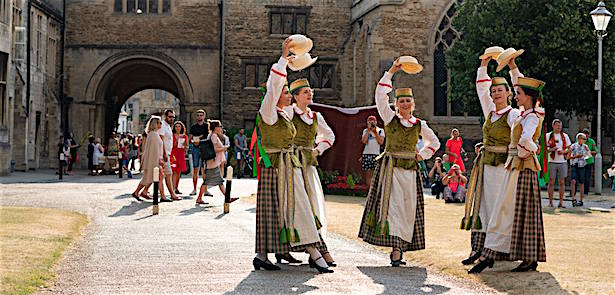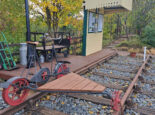Peterborough Together: A sense of belonging

One of the most recent major communities to have settled in Peterborough is that from Lithuania – and it may well be the next community to establish its own cultural festival. The Moment talked to chairman of Peterborough Lithuanian Community, Ruta Dalton, about the Lithuanian experience and her hopes for the future
First of all, tell us a little about the Peterborough Lithuanian Community group…
Our role is to keep Lithuanian culture alive, to celebrate our independence and our national days, but also to integrate our community. One thing I am a very strong supporter of is promoting voting in local elections, as a right and also our obligation. We also organise events where we invite everyone along – not just members of the Lithuanian community.
What is the history of Lithuanians in Peterborough?
Lithuanians started to arrive a little bit before Lithuania joined the European Union in 2004. Then we had a bigger influx into Peterborough and the surrounding area – Boston, Wisbech and the rest of East Anglia region. We think we have around 8-10,000 Lithuanians in Peterborough – although some have left due to uncertainties over Brexit. The official census says around 4,000 but we think it’s more, because not everyone declares and people share houses and flats. Lots of those people still work in agriculture, in factories, and in warehouses like Amazon, where it’s mainly manual labour. A lot of the people from this community are actually quite highly educated, but end up working in factories because they don’t speak the language yet or aren’t confident enough to push themselves hard to get to the next level. Nevertheless, there are also a lot of good stories about people improving their lives and having local businesses.
Can you give an example of that?
There is a nice story about something that happened this summer; there is a Lithuanian church established here, and that church organised a cleaning day in Millfield. They thought ‘We live here, we should do something…’ So, one weekend they organised a get-together and collected litter from the street and cleaned up, then had a barbecue afterwards. It’s small things like that that can make a difference. They did it because they wanted clean streets, but also it’s just good behaviour, setting a good example – and it helps everyone. That was organised by a husband and wife. I thought it was a brilliant idea and hopefully we can repeat it every year now.
Why do most Lithuanians come to the UK?
Most of them come for economic reasons. Nobody in Lithuania is extremely poor or living in terrible conditions – it’s a lovely country with good standards – but the ones who left first were probably a little bit frustrated by the older generation. Back in the Soviet Union everyone had a job, but when Lithuania became independent they had to deal with the new free-market economy. It was no longer the case that the state gave you a job; you were on your own. I think the first wave came from those people who felt they had to do something about it. So, many came to the UK – and also to Spain which was very popular at that time – and did agricultural jobs. I think it almost became like a fashion! A lot of our people have university degrees – education is a No.1 priority for us – but often they then have difficulty finding a good job in Lithuania. Maybe they can find a job in a factory that pays €300 – but they can do a similar job in the UK and get paid maybe €1,200. And most come not planning to stay, but many end up staying anyway. We absolutely love our country, but once you arrive here you realise that if you work very hard – even just at mushroom picking or something like that – you can earn £20,000 a year. That’s not big money for a British person, but to a Lithuanian is massive.
What brought you here?
I didn’t plan to come to the UK. I am a qualified accountant, so always had a job and travelled with the job, living in Poland, Belgium, Switzerland – and then in Switzerland my company offered me a big promotion to come to the UK, but just for three years. So, I came and I worked in Cambridge – and then after six months I met my future husband, who is British. He has been a Peterborian all his life, so I settled here. So, basically, I stayed because of love!
What do you most enjoy about life in the UK?
Probably nature. This is such a beautiful country, with lots of green. You have everything – the sea, mountains, it’s green and its tidy. British people invest time and energy into their gardens, and the agricultural land is also very tidy, with neat hedges. It’s very beautiful. You love your trees and shrubs and flowers.
Looking to the future, what events do you have coming up within the Lithuanian community?
For Christmas we’ll be doing an event for Lithuanian parents and children one Saturday in December. And anyone can come. It’s very open. When we do our independence celebrations we always invite our councillors from the areas we live in, and the mayor and usually we get several coming along. It’s actually open to anyone, but typically we don’t get many British people coming along because very few know about it.
How important is it to have that openness?
Both sides need to know about each other more. There is sometimes discrimination but no one is born discriminating – and often it’s the media that is telling us to think this way. That’s why it’s so important to highlight the positives.
Peterborough has a long-established Italian Festival, and now a Polish Festival, allowing everyone to enjoy the food, drink and music and meet people from those countries. Could we be seeing a Lithuanian festival soon?
We’re not quite there yet! For those types of events you need money and the ability to organise something in a big scale – but we are building up to it. Our biggest event so far was quite an interesting one… Worldwide, 900,000 Lithuanians emigrated since joining the EU – a big portion of the population. So, what the government did in the last couple of years was to say that on 6 July, which is our Statehood Day, we should all sing our national anthem, wherever we were, at 7pm. It became so popular that in Peterborough this year we got 500 people singing in front of the Cathedral, all dressed up in colours and with flags. Just five minutes singing, and ten minutes of chat, then everyone dispersed again. But the power of that song and all those people being happy and cheerful was such that the Dean said: ‘Let’s do this again next year, but next time I’ll put your flag on the flagpole!’ In future we think maybe we can build on that and perhaps have a bit of food, and gradually expand to the level of the Italian or Polish festivals. When you begin to attract more people then others look at it and think ‘Maybe I can support this…’ And it is such a positive event, there’s so much energy! For people who want to know more, we have a Facebook page which is actually quite busy, with lots of articles – and one of our writers is actually writing a novel about Peterborough Lithuanians. She has a PhD in Social Science and is now back in Lithuania publishing the books through a big publisher. That’s coming out in the spring, so I am looking forward to that!
Can events such as these help to change attitudes?
There’s a lot of negativity about immigrants, especially Peterborough Lithuanians, because a lot of them work in factories or low-skilled jobs, and there are some social problems that come with that. But we try to focus on some of the more positive stories, having celebrations and giving awards, and I have noticed that over the last few years the mindset of our own people has changed. They are more positive, they are more confident… For example, there was an article about GCSE results, and I noticed there was a Lithuanian name listed among the best students, so I took a picture and posted it on Facebook! Everyone was so proud. We should not ignore the negative, but we should be more positive.
To find out more about future events, search for Peterborough Lietuvių Bendruomenė on Facebook















